You’ll typically need about £1,447 a month to cover living costs in Southampton as a single person, with centre one‑bed rent around £1,026 and outside one‑bed about £859. Utilities, broadband and transport add roughly £300–£350, while groceries and dining vary by habits. Rent alone can take 34–40% of a typical net pay, so budget carefully and compare neighbourhoods, transport and childcare options to see how affordable the city really is if you keep exploring.
Monthly Budget Breakdown for a Single Person in Southampton
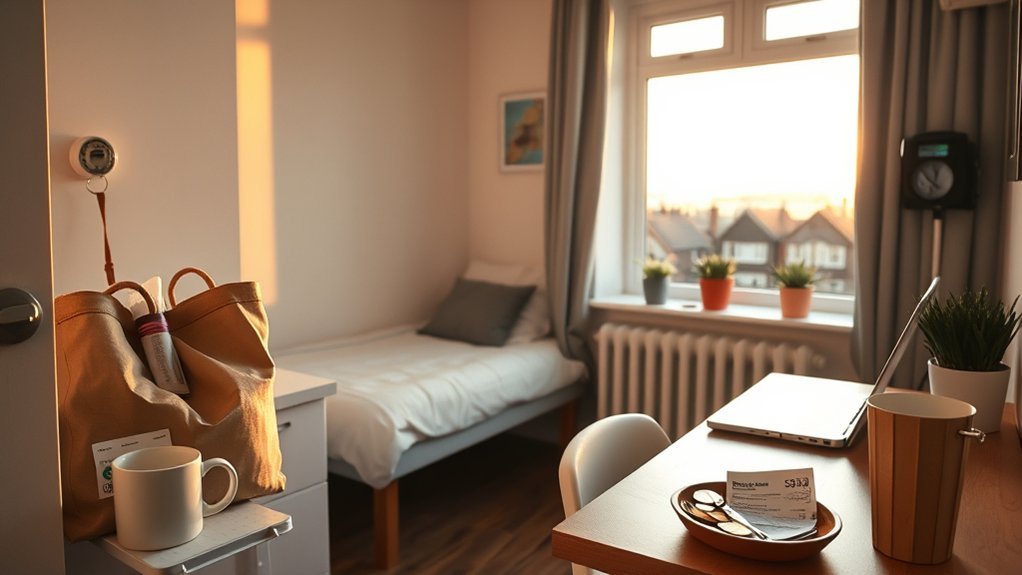
If you’re planning your monthly budget in Southampton, expect total living costs (including rent) to average about £1,447 for a single person.
When living in Southampton, break that down: rent will be the biggest slice—expect roughly £1,026 for a one‑bed in the centre or £859 outside. Utilities for an 85 m² flat run about £199, and broadband (60 Mbps+) is roughly £29. Groceries and eating costs (student average) sit near £355 monthly; typical prices include milk £1.23/L, eggs £3.56 per dozen, and apples £1.74/kg.
Transport options cost around £64.50 for a monthly pass (some sources £67–£108).
Leisure adds modest extras: a cinema ticket £9–£10 and gym membership about £32–£34/month.
Use this data to allocate spending categories: rent, utilities, food, transport, and leisure. Adjust based on location and lifestyle to keep your monthly plan realistic and balanced.
Rent and Housing: Prices by Apartment Type and Neighbourhood

Housing costs take the biggest slice of your monthly budget in Southampton, and where you live makes a clear difference: a one‑bed in the city centre averages about £1,026/month (typical range £900–£1,500) versus £859 outside the centre, while three‑bed apartments run roughly £1,775 centrally and £1,325 in outer neighbourhoods.
You’ll choose between on‑campus affordability and private one-bedroom apartment options; private student one‑beds commonly sit at £693–£850 and may exclude bills, while halls often bundle utilities and a Unilink bus pass. Purchase prices also vary: about £4,600/m² central and £4,100/m² outside.
- City centre one-bedroom apartment: ~£1,026/month (range £900–£1,500).
- Outer one-bedroom apartment: ~£859/month.
- Three-bedroom: ~£1,775 centre, ~£1,325 outside.
- Student private vs on‑campus: private £693–£850; halls can include utilities/bus pass.
Use neighbourhood, size and included bills to estimate your actual monthly housing spend.
Food, Groceries and Dining Out Costs
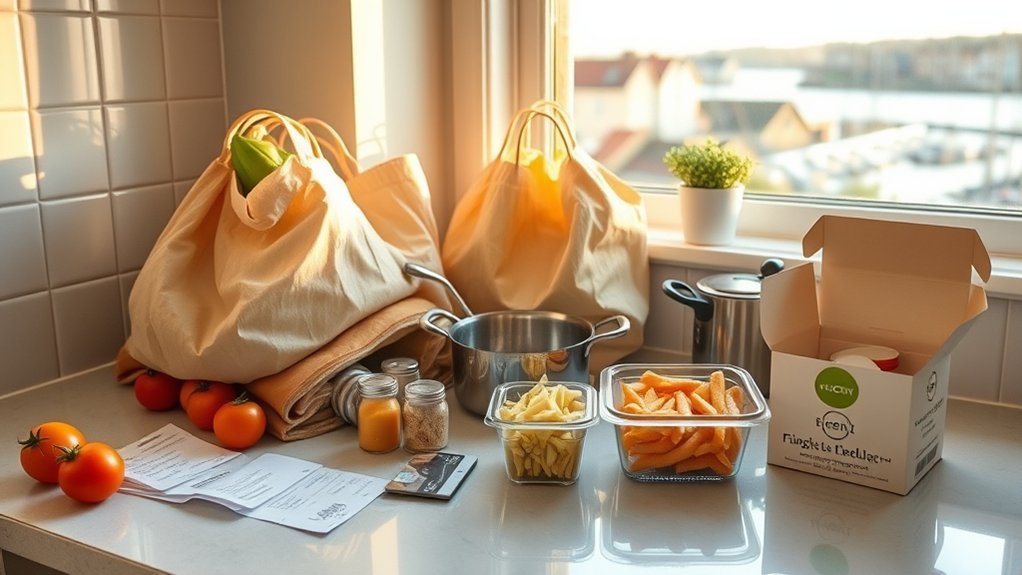
Typically, you’ll spend about £355 a month on food as a student in Southampton, with home cooking much cheaper than eating out. You can stretch that budget by buying basics: 1L milk £1.21, 12 eggs £3.04, 1kg apples £1.74, 1kg potatoes £1.16 and 1kg tomatoes £2.49.
Expect to spend around £355 monthly on food as a student—cook at home and buy basics to save.
Cooking at home turns weekly supermarket trips into predictable spending and lowers your Cost of Living noticeably.
When you do eat out, expect a range: a mid-range three-course meal for two is around £65 (£40–£100), while a basic pub dinner for two is about £37. Casual costs include a cappuccino (~£3.58, £1.50–£5.00) and a McMeal (~£7.50, £5.80–£10.00).
Alcohol varies: draught domestic beer in a pub ~£6.00 versus supermarket 0.5L bottle ~£1.48, and a mid-range bottle of wine ~£6.25. Use supermarkets and cooking to control your Southampton living budget.
Transport, Commuting and Vehicle Expenses
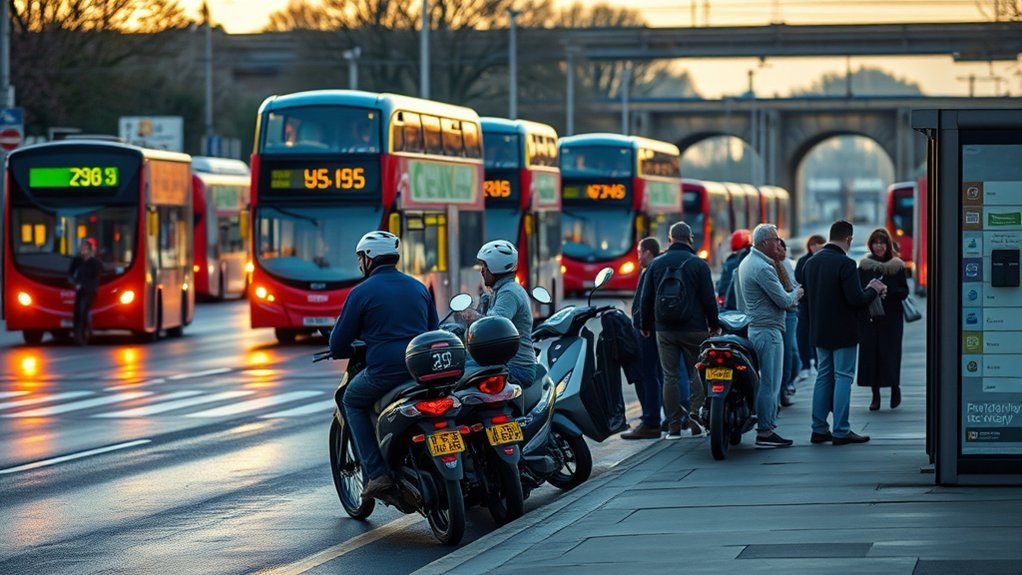
After food, getting around Southampton is another predictable monthly cost you’ll want to plan for: a monthly public transport pass runs about £64.50–£67.30, while single fares are roughly £2.10–£2.27 each. You’ll choose between buses, taxis or driving depending on distance, frequency and budget per month.
- Public transport: pass £64.50–£67.30 per month; pay-as-you-go singles ~£2.10–£2.27.
- Taxis: flag £3.20 + ~£1.50/km; an 8 km weekday trip totals ~£13–£14; waiting time ~£24/hour.
- Driving: petrol ~£1.41–£1.54/L; factor monthly fuel and parking on top of purchase costs.
- Vehicle purchase: new Volkswagen Golf ~£28,285; Toyota Corolla ~£30,129 — include insurance, depreciation and monthly running costs.
Plan per month totals based on commute length and frequency. If you commute daily, a season pass typically lowers per-trip cost; occasional drivers should model fuel and occasional taxi trips.
Utilities, Internet and Mobile Plans
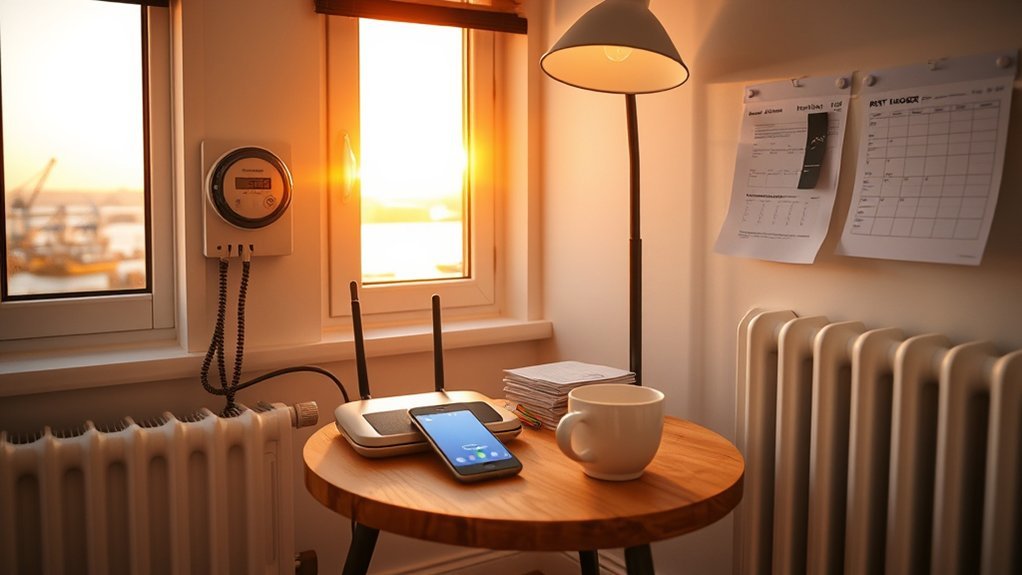
You’ll typically pay about £199.44 per month for basic utilities for an 85 m² apartment, with actual bills varying by provider and usage.
Expect around £29.04 for broadband (60 Mbps+) and roughly £13.75 for a 10 GB+ mobile plan.
Factor in transport extras—single fares ~£2.10, monthly passes ~£64.50, and taxi waiting charges ~£24/hour—when budgeting alongside these household costs.
Typical Monthly Utilities
While rent covers most of your housing cost, you’ll usually pay extra for basic utilities—electricity, heating, cooling, water and garbage—which average about £199.44 per month for an 85 m² apartment; broadband (60 Mbps+) adds roughly £29.04 and a mobile plan with 10+ GB costs about £13.75, so plan on around £242–£250 monthly if you’re renting privately (university halls often include utilities and sometimes the Unilink bus pass).
- Expect ~£199.44 monthly for core utilities in a private flat.
- Budget ~£29.04 for reliable home broadband (60 Mbps+).
- Add ~£13.75 for a 10+ GB mobile plan.
- Note university-managed Living options often bundle utilities (and occasionally transport), reducing your separate bills.
These figures are practical averages for monthly budgeting.
Internet and Mobile Costs
Getting set up with internet and mobile services in Southampton is straightforward and reasonably affordable: a typical home broadband plan (60 Mbps or faster) runs about £29.04/month, while a basic mobile plan with 10+ GB averages £13.75/month, and pay-as-you-go calls cost roughly £0.17/minute on prepaid tariffs.
You’ll typically pay internet and mobile separately from the monthly utilities bill (electricity, heating, water, garbage), which averages £199.44 for an 85 m² apartment.
If you live in private accommodation rather than university halls, budget for both broadband and a SIM plan; many halls include transport perks but not connectivity.
Compare providers for bundled offers, check contract lengths, and consider SIM-only deals if you want flexibility and lower monthly costs.
Leisure, Gyms, Childcare and Education Costs
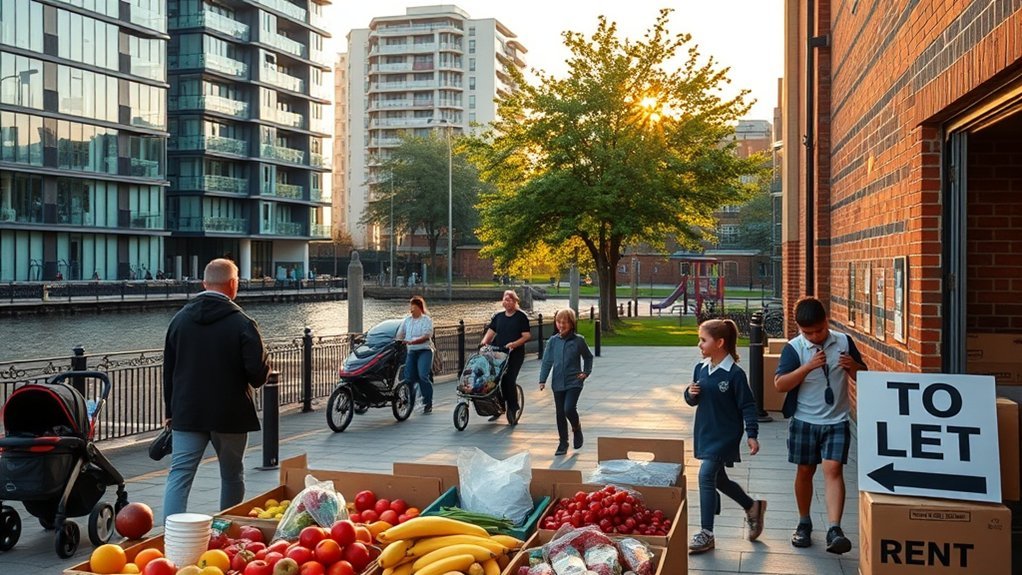
When planning your budget, factor in regular leisure and family costs that can add up quickly in Southampton: gym memberships typically run £32–£34 per month (budget options from about £27), cinema tickets cost roughly £9–£10, a pub dinner for two is around £37, and an Italian meal with wine and dessert about £71. You’ll also face childcare and education costs that materially affect monthly spending.
Private full-day preschool averages about £1,125/month (£900–£1,600), and international primary fees are roughly £13,500/year. Casual coffee runs cost about £3.50–£3.73, and a pint is ~£5–£6. For weekend sport, Court Rent (1 Hour) — tennis court hire — is about £15.
- Gym membership: £27–£34/month (business clubs at top end).
- Cinema and casual leisure: £9–£10 per ticket; coffee £3.50–£3.73.
- Dining out: pub £37; Italian dinner £71 for two.
- Childcare & schooling: preschool ~£1,125/month; international primary ~£13,500/year.
How Salaries and Affordability Compare Across Nearby Cities

To compare salaries and affordability across nearby cities, look at Southampton’s average net monthly pay of £2,536.52 alongside typical rents — a city‑centre one‑bed at £1,026 exceeds the 30% affordability guideline of about £761.
Adjust for local cost differences (transport ~£64.50, utilities ~£199.44) when comparing to Portsmouth, Bournemouth and Brighton, where rents are often similar or higher.
This shows you’ll generally get comparable take‑home pay in the region but housing remains the main pressure on your budget.
Salary Comparisons by City
Although your take‑home pay in Southampton averages £2,536.52 per month, housing and family costs quickly show how that figure translates into real affordability.
You’ll want to compare nearby cities to see if a higher salary offsets different costs like Monthly Fee for childcare or school.
- Portsmouth: shorter commute (31.7 km) may offer slightly lower rents, improving disposable income relative to Southampton.
- Basingstoke: jobs often pay more, but housing can be pricier; check net salary vs. a one‑bed rent of £1,026 city‑centre or £859 outside.
- Bournemouth: similar market to Southampton; small salary differences can swing affordability.
- Consider mortgage rates (5.62% for 20‑year fixed) and family costs (childcare ~£1,125/month; international school £13,500/year) when comparing.
Cost‑Of‑Living Adjustments
Shifting from salary comparisons by city, you’ll want to see how cost‑of‑living adjustments change what that £2,536.52 monthly net actually buys across nearby locations.
You’d compare net pay against typical living expenses: Southampton’s average single‑person monthly cost (including housing) is about £1,447, leaving discretionary income after essentials.
Rent and transport drive most differences — one‑bed central £1,026, outside £859, and monthly travel about £64.50–£108, so commuting costs stay well below London levels.
Property prices (£4,600/m² centre; £4,100/m² outside) and a ~5.62% 20‑year mortgage rate keep ownership costs lower than pricier south‑coast or Greater London markets.
Versus Portsmouth and Bournemouth, Southampton generally offers better affordability when you adjust salaries for local living expenses.
Housing Affordability Differences
When you compare take‑home pay to typical housing costs in Southampton and nearby cities, affordability looks relatively favourable: the average net salary of £2,536.52 covers the city’s average single‑person monthly cost of about £1,447 (including housing), meaning residents typically spend roughly 57% of net income on essentials and rent.
You can see practical differences when you break things down:
- City-centre one-bedroom rent averages £1,026/month (outside centre £859), consuming ~40% of net pay in the centre versus ~34% outside.
- Southampton ranks 116/277 for overall cost, more affordable than many Russell Group cities.
- Buying costs ~£4,600/m² centre, mortgage rates ~5.62% affect monthly payments.
- Students/low-income households can access halls or private flats at ~£693–£850 to improve affordability.
Frequently Asked Questions
How Much Does It Cost to Live in Southampton?
You’ll need about £1,447 monthly to live in Southampton; Housing Affordability depends on rent (city centre ~£1,026, outside ~£859), utilities ~£199, internet ~£29, transport £65–£108, against net pay ~£2,537.
What Is the Average Cost of Living in the UK per Month With Rent?
You’ll find the national average monthly cost of living with rent in the UK is roughly £1,500–£1,700, depending on location and household size; use local salary and housing data to plan and avoid spending over 30–40%.
Is Southampton Worth Living?
Yes — you’ll find Southampton worthwhile: affordable housing, good transport, coastal lifestyle, strong universities, and a friendly community vibe. You’ll save versus many southern cities, especially if you cook, use public transit, and pick smart accommodation.
How Much Does It Cost to Live Each Month?
Think of stepping into a Hardy novel; you’ll need roughly £1,400–1,600 monthly. You’ll budget Housing Options (centre £1,026, outside £859), utilities ~£199, internet £29, transport £65–£108, and food ~£355.
Conclusion
You now have a clear, data-driven snapshot of monthly living costs in Southampton to guide your choices. With rent, utilities, groceries, transport and leisure all mapped out, you can plan realistic budgets or compare neighbourhoods quickly. Want to prioritize saving, comfort or a shorter commute? Use the figures to test scenarios — adjust rent or transport and see how your disposable income changes — then pick the option that fits your priorities best.


